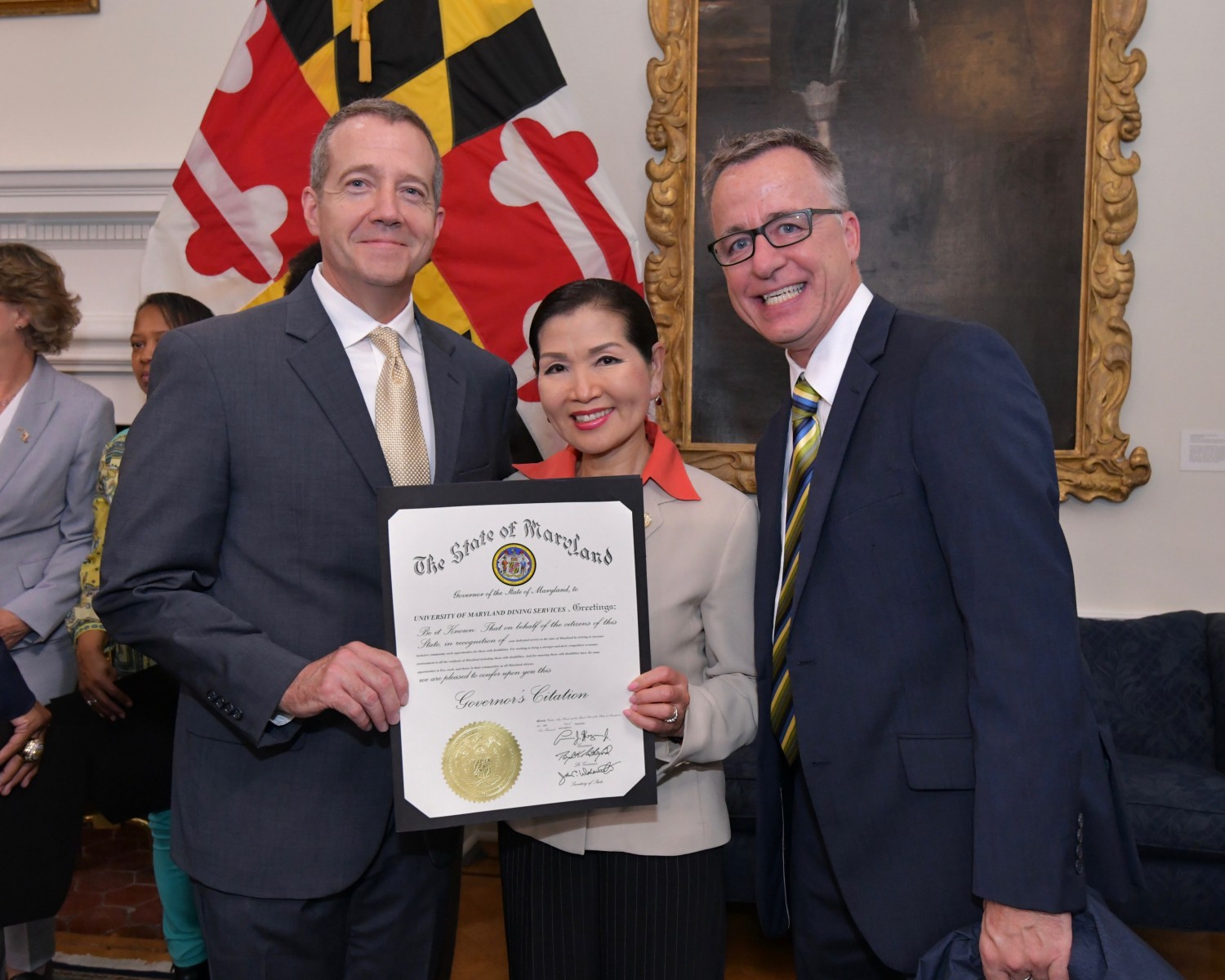Recently-hired University of Maryland Dining Services employee Michael Greene smiled when he was asked about his new job.
Greene, who has a developmental disability, has worked at 251 North for three weeks. He said he enjoys the work, which includes tasks like washing dishes, separating compost, cleaning silverware and sweeping.
251 general manager Rob Fahey, described Greene as a “hard worker.”
“He comes in and goes straight to work,” Fahey said. “He gets his apron on, his gloves on.”
Fahey, along with South Campus Dining Hall assistant director Roy Thomason, traveled to Annapolis earlier this month to accept an award for fostering an environment of inclusivity in their employment practices.
This academic year, Dining Services has hired two individuals with developmental disabilities as part of an ongoing push to connect disabled adults with their communities. A total of eight such people currently work with the department, said Dining Services spokesperson Bart Hipple.
“It’s about embracing each other and valuing the diversity, treating each other with dignity and respect, and then building teams out of those individuals,” Thomason said.
[Read more: More UMD professors are improving their websites for students with disabilities]
The hiring practice began almost thirty years ago when Dining Services partnered with The Arc, a national disability rights organization. In 2016, the department partnered with the nonprofit Community Health Inclusion Center, Inc., an advocacy group for people with disabilities that works to provide them with employment.
Fahey or Thomason contact CHI whenever there’s an open position in Dining Services, Thomason said, and then work with the center to find the best fit for the employees.
“Our programs would not be as successful without these men and their teams,” CHI Inc. employee Nytalia Wood said of Fahey and Thomason at the presentation of an “outstanding achievement in the inclusion of individuals with disabilities in the employment sector” award given to Dining Services on Sept. 14 at the State House.
Dining Services does their best to ensure that individuals with disabilities can be successful wherever they’re placed without feeling overwhelmed, Thomason said. CHI and The Arc also provide job coaches for these employees as needed.
“They have an opportunity to maximize their talents and skills here,” Hipple said.
In 2017, less than 19 percent of people with disabilities were employed in the United States, according to the Bureau of Labor Statistics. In contrast, more than 65 percent of non-disabled people were employed.
JoEllen Barnhart, an oral communication lecturer who serves on the President’s Commission on Disability Issues and the Maryland Developmental Disability Council, is the parent of two developmentally disabled adults. She said that employment opportunities are “emphasized in the disability community,” and that Dining Services is providing an “exciting opportunity” for the people it hires.
[Read more: UMD professors start ADHD counseling group]
“It’s a core goal and policy driver and for me,” Barnhart said. “It’s exciting to see the University of Maryland expanding their inclusive concept and the idea of what ‘inclusive’ and ‘diversity’ means.”
The disabled employees take Dining Services positions in dishwashing and hospitality roles and are paid a fair wage, according to a CHI press release.
Thomason said the practice has been met with student enthusiasm, some of whom sent “appreciative” comments to the department.
“It’s not uncommon to see the same students, year after year, interacting with those employees that we continue to work with and you see that there’s an exchange of happiness,” he said.
Freshman government and politics major Anita Tharmarajah said she’s glad the department is making an effort to diversify its staff.
“I think it’s a great way to boost employment opportunities for people with developmental disabilities,” Tharmarajah said. “I don’t think that it has any negative effect on our experience or the food that we get, so I think it’s a great idea.”
Barnhart said that while she sees progress being made on integrating disabled people on university campuses across the country, continued efforts need to be made to address the employment disparity in the future.
“This is a huge cultural gap,” she said, “and it takes time.”



